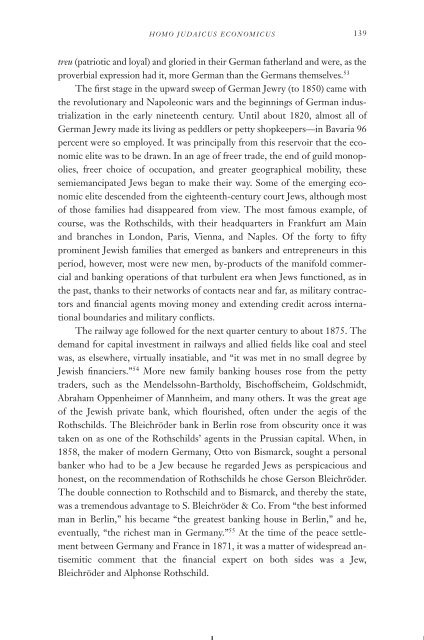41845358-Antisemitism
41845358-Antisemitism
41845358-Antisemitism
Create successful ePaper yourself
Turn your PDF publications into a flip-book with our unique Google optimized e-Paper software.
HOMO JUDAICUS ECONOMICUS<br />
139<br />
treu (patriotic and loyal) and gloried in their German fatherland and were, as the<br />
proverbial expression had it, more German than the Germans themselves. 53<br />
The first stage in the upward sweep of German Jewry (to 1850) came with<br />
the revolutionary and Napoleonic wars and the beginnings of German industrialization<br />
in the early nineteenth century. Until about 1820, almost all of<br />
German Jewry made its living as peddlers or petty shopkeepers—in Bavaria 96<br />
percent were so employed. It was principally from this reservoir that the economic<br />
elite was to be drawn. In an age of freer trade, the end of guild monopolies,<br />
freer choice of occupation, and greater geographical mobility, these<br />
semiemancipated Jews began to make their way. Some of the emerging economic<br />
elite descended from the eighteenth-century court Jews, although most<br />
of those families had disappeared from view. The most famous example, of<br />
course, was the Rothschilds, with their headquarters in Frankfurt am Main<br />
and branches in London, Paris, Vienna, and Naples. Of the forty to fifty<br />
prominent Jewish families that emerged as bankers and entrepreneurs in this<br />
period, however, most were new men, by-products of the manifold commercial<br />
and banking operations of that turbulent era when Jews functioned, as in<br />
the past, thanks to their networks of contacts near and far, as military contractors<br />
and financial agents moving money and extending credit across international<br />
boundaries and military conflicts.<br />
The railway age followed for the next quarter century to about 1875. The<br />
demand for capital investment in railways and allied fields like coal and steel<br />
was, as elsewhere, virtually insatiable, and “it was met in no small degree by<br />
Jewish financiers.” 54 More new family banking houses rose from the petty<br />
traders, such as the Mendelssohn-Bartholdy, Bischoffscheim, Goldschmidt,<br />
Abraham Oppenheimer of Mannheim, and many others. It was the great age<br />
of the Jewish private bank, which flourished, often under the aegis of the<br />
Rothschilds. The Bleichröder bank in Berlin rose from obscurity once it was<br />
taken on as one of the Rothschilds’ agents in the Prussian capital. When, in<br />
1858, the maker of modern Germany, Otto von Bismarck, sought a personal<br />
banker who had to be a Jew because he regarded Jews as perspicacious and<br />
honest, on the recommendation of Rothschilds he chose Gerson Bleichröder.<br />
The double connection to Rothschild and to Bismarck, and thereby the state,<br />
was a tremendous advantage to S. Bleichröder & Co. From “the best informed<br />
man in Berlin,” his became “the greatest banking house in Berlin,” and he,<br />
eventually, “the richest man in Germany.” 55 At the time of the peace settlement<br />
between Germany and France in 1871, it was a matter of widespread antisemitic<br />
comment that the financial expert on both sides was a Jew,<br />
Bleichröder and Alphonse Rothschild.


